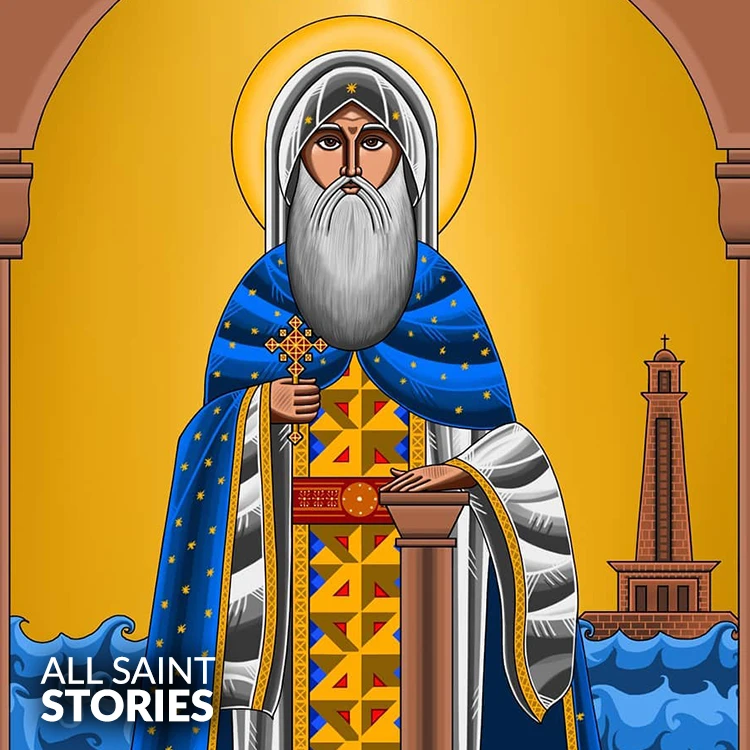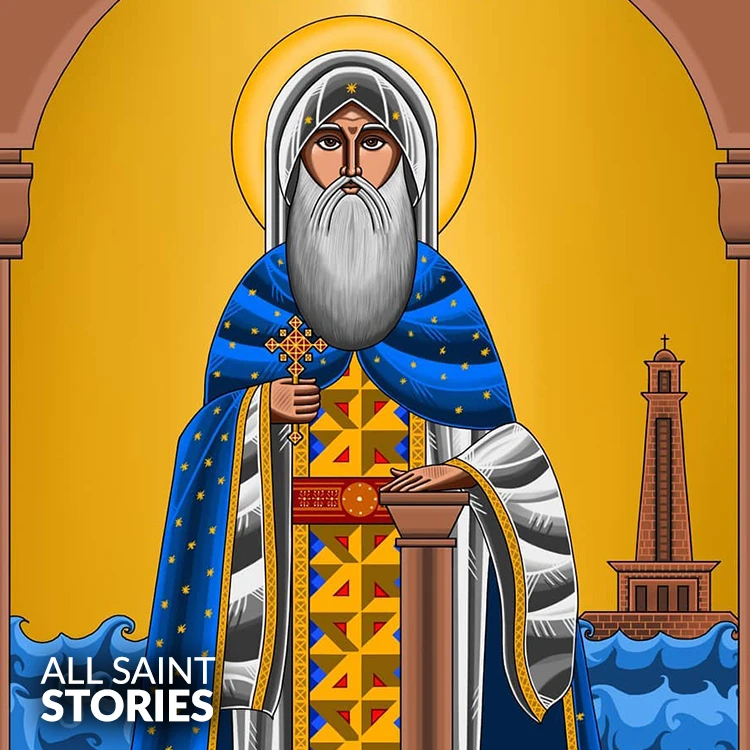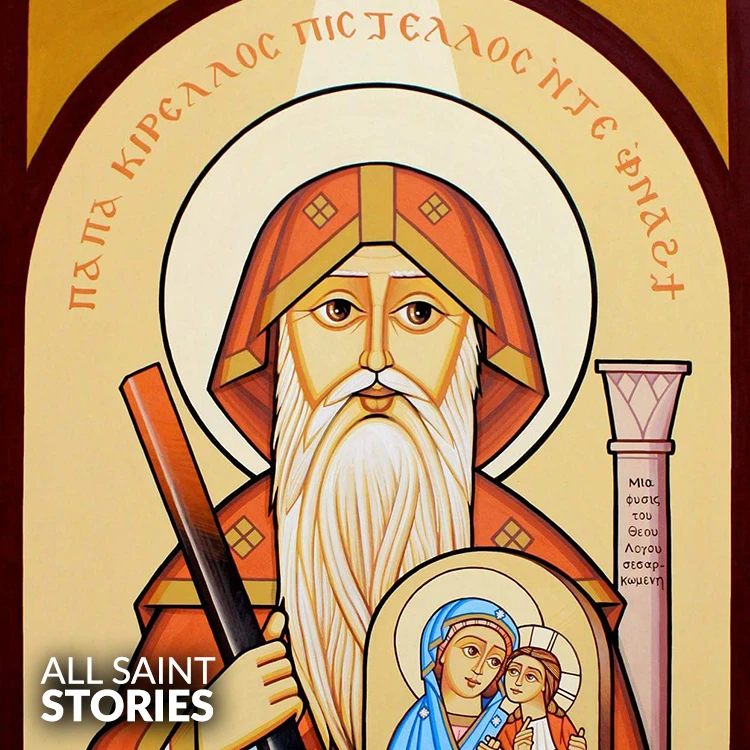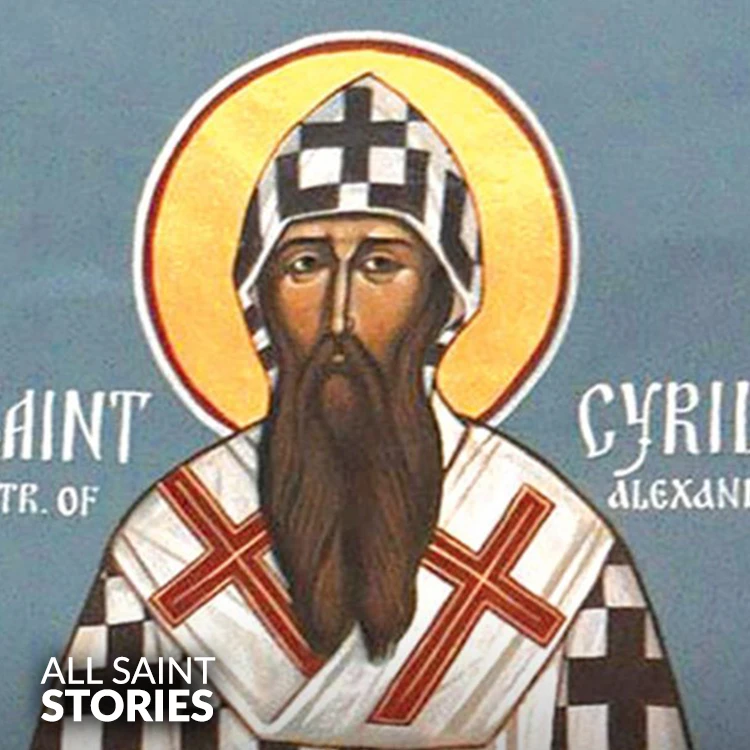"Saint Cyril of Alexandria, defender of the faith and champion of truth, intercede for us before God. Grant us wisdom to understand His Word, courage to stand firm in our beliefs, and compassion to love all people. Help us to follow the example of your unwavering dedication to Christ. Amen."
ST. CYRIL OF ALEXANDRIA
ST. CYRIL OF ALEXANDRIA

St. Cyril of Alexandria was a 5th-century Church Father and theologian, best known for his defense of the Virgin Mary as Theotokos (Mother of God) against the Nestorian heresy. As Patriarch of Alexandria, he fought to preserve the unity of the Church and played a key role in the Council of Ephesus (431 AD). He is venerated as a Doctor of the Church and one of the greatest defenders of Christ's divinity.
St. Cyril was born around 376 AD in Alexandria, Egypt, into a Christian family. He received an excellent education in theology, philosophy, and rhetoric. His uncle, Theophilus, the Patriarch of Alexandria, guided his early religious formation and eventually appointed him as his successor in 412 AD.
As Patriarch, Cyril worked tirelessly to defend orthodox Christian teachings. His greatest theological challenge came from Nestorius, the Patriarch of Constantinople, who claimed that Mary should be called "Christotokos" (Christ-bearer) instead of "Theotokos" (God-bearer). Cyril saw this as a denial of Christ’s divine nature and strongly opposed Nestorius.
In 431 AD, Cyril led the Council of Ephesus, where Nestorius’ teachings were condemned, and the title "Mother of God" (Theotokos) for Mary was affirmed. This council had a lasting impact on Christian theology and solidified Cyril's reputation as a defender of the faith.
Aside from his theological works, Cyril also worked to strengthen the Church in Alexandria. His leadership was marked by conflict with heretics and political struggles, but his commitment to the truth never wavered. He wrote extensively, leaving behind important theological texts that continue to influence Christian doctrine.
Cyril died on June 27, 444 AD, after serving as Patriarch for 32 years. He was later declared a Doctor of the Church for his profound contributions to Christology. His writings remain a cornerstone of Catholic and Orthodox theology, and his defense of Mary's divine maternity is celebrated to this day.
Video Not Found
The information on this website is compiled from various trusted sources. While we aim for accuracy, some details may be incomplete or contain discrepancies.
If you notice any errors or have additional information about this saint, please use the form on the left to share your suggestions. Your input helps us improve and maintain reliable content for everyone.
All submissions are reviewed carefully, and your personal details will remain confidential. Thank you for contributing to the accuracy and value of this resource.
Credits & Acknowledgments
- Anudina Visudhar (Malayalam) – Life of Saints for Everyday
by Msgr. Thomas Moothedan, M.A., D.D. - Saint Companions for Each Day
by A. J. M. Mausolfe & J. K. Mausolfe - US Catholic (Faith in Real Life) – Informational articles
- Wikipedia – General reference content and images
- Anastpaul.com – Saint images and reflections
- Pravachaka Sabdam (Malayalam) – Saint-related content and insights
We sincerely thank these authors and platforms for their valuable contributions. If we have unintentionally missed any attribution, please notify us, and we will make the correction promptly.
If you have any suggestion about ST. CYRIL OF ALEXANDRIA
Your suggestion will help improve the information about this saint. Your details will not be disclosed anywhere.
© 2026 Copyright @ www.allsaintstories.com





 English
English
 Italian
Italian
 French
French
 Spanish
Spanish
 Malayalam
Malayalam
 Russian
Russian
 Korean
Korean
 Sinhala
Sinhala
 Japanese
Japanese
 Arabic
Arabic
 Portuguese
Portuguese
 Bantu
Bantu
 Greek
Greek
 German
German
 Dutch
Dutch
 Filipino
Filipino